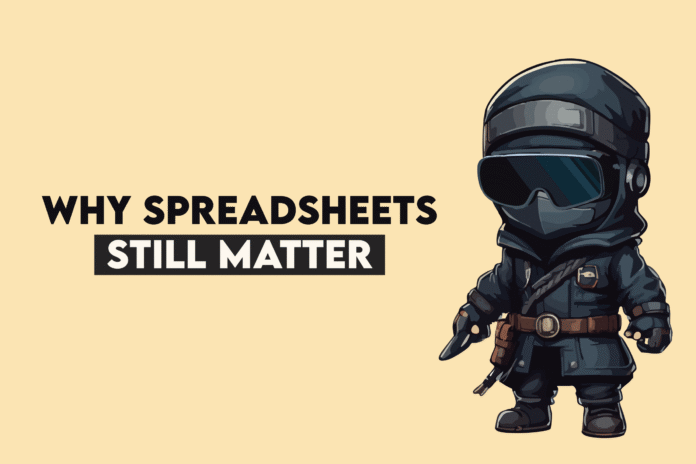Image by Author
You and your company are “data-driven,” right? Surely, that means using the most sophisticated technology for handling data. Having a database in place and querying it with SQL seems like a minimum requirement in that world.
But what if there are cases when a simple spreadsheet beats a carefully written query by a mile? Here are several real-life situations.

Image by Author
1. Your Data Is Small and/or One-Off
Examples of such data include:
- A CSV from a vendor
- A financial model with a few hundred rows
- A simple budget forecast
- A task tracker

Image by Author
It would be almost bizarre to load such data into a database and run a couple of queries. It’s overkill. Open it in Excel or Google Sheets, and you can quickly filter, sort, and perform calculations and transformations. You’d probably still be setting up tables, indexes, and schemas in a database.
2. You Need Speed and Zero Setup
If you don’t have a relational database in place, setting it up requires:
- A running database, local or cloud
- Defined tables and datatypes
- Proper permissions
With spreadsheets? None of that. Even if installation is required, it’s much quicker. But you probably don’t need to install anything, as your machine likely comes with a pre-installed spreadsheet program, or you can easily use a cloud version.

Image by Author
You simply click the file and get moving—especially if you just need to see what’s in it or run a few quick calculations.
3. You Need to Collaborate
Databases can handle collaboration, but they require setting permissions, defining roles, and SQL knowledge.
For example, collaboration in Google Sheets is much easier:
- Share a link with your collaborators
- Add comments
- Track file changes

Image by Author
If your collaborators are outside the data team (e.g., finance, marketing, operations), chances are they don’t use SQL — with spreadsheets, that doesn’t matter.
4. You Want to Visualize and Present Data
SQL is for querying and data analysis, but it’s not great for presenting your findings. Usually, you’d export the output of your queries elsewhere. Ironically, it’s often spreadsheets we were trying to avoid.
If visualizing and presenting data is important and you can perform analysis relatively easily in a spreadsheet, then choose it over SQL. Spreadsheets are both calculation and presentation tools.

Image by Author
Typically, you’d choose spreadsheets over SQL if you need:
- Charts for a presentation
- Pivot tables for executives
- A financial forecast model
5. Your Work Is Iterative and Messy
Examples of such work are building models, brainstorming scenarios, and testing assumptions. This is where I’d use spreadsheets.

Image by Author
You can use them to:
- Brainstorm financial scenarios -> copy the sheet, tweak a few cells, and instantly see the results
- Testing assumptions -> write two formulas, compare them, delete the weaker one; no schema migration needed
- Quick what-if models -> build a rough version in a spreadsheet before formalizing it in SQL
- Ad-hoc annotations -> color-coding, leaving comments, highlighting data
- Formula iteration -> easily change =SUM(A1:A52) to =AVERAGE(A1:A52); no need to rewrite queries or validate syntax
6. Your Audience Doesn’t Speak SQL
Company leaders, project managers, and external clients are far more likely to open a spreadsheet than a database.

Image by Author
With spreadsheets, they get something they can read, tweak, and share without learning a programming language they didn’t intend to learn.
7. You Consider Cost and Access
Maintaining relational databases in production environments can be costly; think of cloud storage, compute resources, and admin time.

Image by Author
Spreadsheets are free or almost free. If your dataset and analysis are something a spreadsheet can handle relatively easily, then choosing it over SQL avoids overhead.
8. You Need Quick Data Entry
Databases aren’t designed for easy manual row-by-row input. You’d either have to write a query or import data from, guess what, a spreadsheet.

Image by Author
Typing data directly into a spreadsheet is easier if you want, for example, to:
- Record meeting notes
- Collect several sales leads
- Track to-dos or deadlines
Conclusion
The best way is, of course, to combine both spreadsheets and SQL. The latter is for heavy data processing, transformation, and analysis, especially if it involves repetitive tasks; then it pays off to establish a logical query and simply re-run it when required. If you’re just starting out or need a refresher, this SQL cheat sheet is a great resource for core concepts you’ll actually use.
Spreadsheets are better when you’re looking for agility, quick understanding of data, lighter analyses, quick data visualizations, and sharing.
Nate Rosidi is a data scientist and in product strategy. He’s also an adjunct professor teaching analytics, and is the founder of StrataScratch, a platform helping data scientists prepare for their interviews with real interview questions from top companies. Nate writes on the latest trends in the career market, gives interview advice, shares data science projects, and covers everything SQL.
